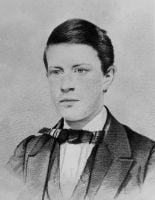 1842 - 1863 (20 years)
1842 - 1863 (20 years)
| |
Date |
Event(s) |
| 1 | 1842 | - 1842: First Christmas card
- 1842: First UK public telegraph lines, from Paddington to Slough and Gosport to London
|
| 2 | 1843 | - 1843: Alexander Bain (1818-1903) invented an early fax machine
|
| 3 | 1844 | - 1844: Charles Darwin wrote, but didn't publish, an essay presaging the theory of the origin of species.
- 1844: Samuel Finley Breese Morse demonstrates a telegraph, using a code of his own invention
- 1844: Parliament passes the Bank Charter Act. Foundation of the Rochdale Co-Operative Society and the Royal Commission on the Health of Towns
- 1844: Two years of railway mania begins across Britain. Massive investment and speculation leads to the laying of 5,000 miles of track
|
| 4 | 1845 | - 1845: Irish Potato Famine kills more than a million people in two years
- 1845: Engels publishes 'The Condition of the Working Class in England'
- 1845: There are reckoned to be 210 accountants in London
|
| 5 | 1846 | - 1846: End of Sir Robert Peel's Ministry. Whigs come to Power. Repeal of the Corn Laws
|
| 6 | 1847 | - 1847: Flourens discovered the anesthetic properties of chloroform
- 1847: Levi Strauss invents denim jeans
|
| 7 | 1848 | - 1848: Major Chartist demonstration in London. Revolutions in Europe. Parliament passes the Public Health Act
- 1848: Karl Marx publishes 'The Communist Manifesto' and 'Das Kapital'
|
| 8 | 1849 | - 1849: Howe patents the safety-pin
|
| 9 | 1850 | - 1850: American Joel Houghton invented the first dishwasher. He made it out of wood, and gave it a hand-turned wheel that splashed water on the dishes inside. It didn't really work, but it did get the first "dishwasher" patent
- 1850: First machine-made paper bag
|
| 10 | 1851 | - 1851: The Great Exhibition is staged in Hyde Park. Thanks to Prince Albert, it is a great success
- 1851: Patent for Singer sewing machine issued
|
| 11 | 1852 | - 1852: Death of the Duke of Wellington. Derby's first minority Conservative government. Aberdeen's coalition government is established
|
| 12 | 1853 | - 1853: Potato crisps invented by a cook named George Crum.
- 1853: Florence Nightingale first recommended the regimen of cleanliness which dramatically reduced the death rate in hospitals
- 1853: Vaccination against smallpox is made compulsory. Queen Victoria uses chloroform during birth of Prince Leopold. Gladstone presents his first budget
|
| 13 | 1854 | - 1854: The Northcote-Trevelyan civil service report is published; and The Crimean War begins, as Britain and France attempt to defend European interests in the Middle East against Russia
|
| 14 | 1855 | - 1855: John Snow, investigating London's piped water supply, showed graphically that cholera could be transmitted by water from a particular pump.
- 1855: End of Aberdeen's coalition government. Palmerston's first government comes to power
- 1855: Yale lock invented
|
| 15 | 1856 | - 1856: Crimean War comes to an end. The Victoria Cross is instituted for military bravery
|
| 16 | 1857 | - 1857: Cyrus Field made his first attempt at laying a trans-Atlantic telegraph cable. In 1866, his fourth attempt was successful.
- 1857: The Second Opium War opens China to European trade. The Indian Mutiny erupts against British Rule on the sub-continent
|
| 17 | 1858 | - 1858: Derby establishes his second minority government. Parliament passes the India Act
- 1858: Eraser fitted to end of pencil
|
| 18 | 1859 | - 1859: Darwin in 'On the Origin of Species by Means of Natural Selection or the Preservation of Favored Races in the Struggle for Life', asserted all life had a common ancestor and that the origin of species was natural selection
- 1859: End of Derby's second minority government. Palmerston brings his second Liberal government to power.
- 1859: Smiles' 'Self-Help' published
|
| 19 | 1860 | - 1860: Joseph Wilson Swan invented the light bulb, an incandescent lamp using a carbon filament.
- 1860: Gladstone's budget and the Anglo-French Cobden Treaty codifies and extends the principles of free trade
|
| 20 | 1861 | - 1861: Ignaz Philipp Semmelweis published his deduction that childbirth fever was transmitted on the hands of doctors during their examinations
- 1861: Death of Prince Albert, Prince Consort
|
| 21 | 1862 | - 1862: Pasteur published the 'germ theory:': Infection is caused by self-replicating microorganisms, and that attenuated viral cultures granted immunity. These beneficent antigens he named 'vaccines' in honor of Jenner and his vaccinia virus
- 1862: Parliament passes the Limited Liability Act in order to provide vital stimulus to accumulation of capital in shares
|
| 22 | 1863 | - 1863: Edward, Prince of Wales, marries Princess Alexandra of Denmark. The Salvation Army is founded
|
This site powered by v. 14.0.3, written by Darrin Lythgoe © 2001-2024.
Maintained by . | .

